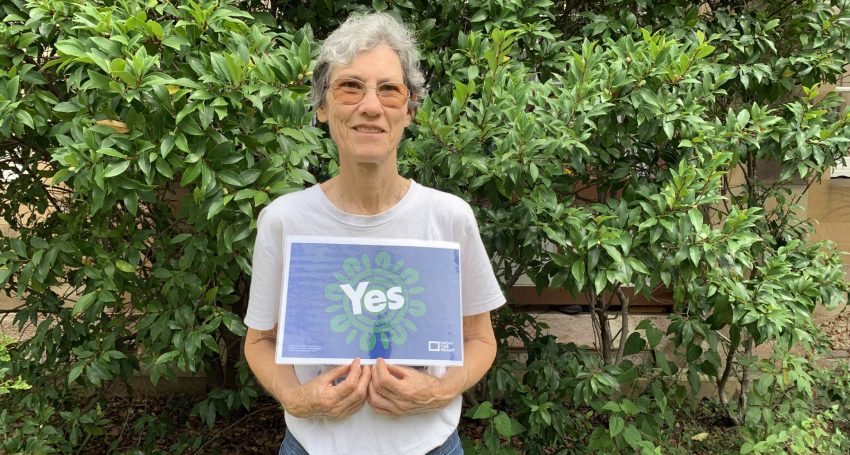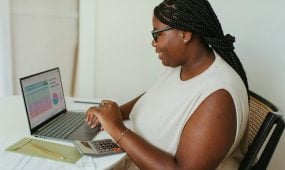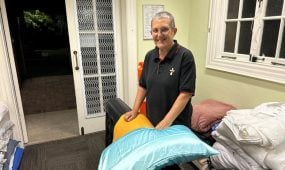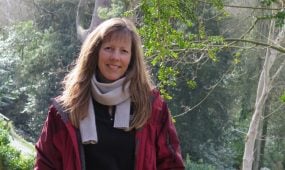Why I am voting “yes” in the referendum: Marilyn Wright
Justice & Advocacy
“I am not personally responsible for the past and cannot change it; however, this year’s referendum is my chance to take some personal responsibility for what happens in the future. I seek a future of compassion, fairness and reconciliation, where the grace of God is evident as we walk forward together — and listen,” says Marilyn Wright from The Parish of Mt Gravatt

Story Timeline
Why I am voting “yes” in the referendum
- Why I support constitutional recognition through an Aboriginal and Torres Strait Islander Voice to Parliament: Aunty Dr Rose Elu
- Why I am voting “yes” in the referendum: Sue Cooke
- Why I am voting “yes” in the referendum: The Ven. Geoff Hoyte
- Why I am voting “yes” in the referendum: Phyllis Marsh
- Why I am voting “yes” in the referendum: Bishop Daniel Abot
- Why I am voting “yes” in the referendum: Adrian Malone
- Why I am voting “yes” in the referendum: The Rev’d Cameron Freese
- Why I am voting “yes” in the referendum: The Rev’d Rick Gummow
- Why I am voting “yes” in the referendum: Uncle Milton Walit
- Why I am voting “yes” in the referendum: Marilyn Wright
- Why I am voting “yes” in the referendum: Barry Kuskopf
- Why I am voting “yes” in the referendum: Aiden Wu
- Why I am voting “yes” in the referendum: Reg Dean
- Why I am voting “yes” in the referendum: Jill Rylatt
I grew up in the South Burnett area, close enough to the Cherbourg reserve to hear the adults around me refer to Aboriginal people in words that I will not repeat, but not close enough to actually meet any Aboriginal people.
In my early 20s, I read stories written by the brilliant Kath Walker about her childhood, and discovered that she and her fellow Aboriginal high school students were discouraged from doing academic subjects.
Advertisement
As a 13 year old, I visited an Aboriginal reserve outside Alice Springs and saw row upon row of two-roomed corrugated iron huts on concrete slabs. It was obvious that very few were occupied. I look back now and realise that this is because there was little input from community members before their construction.
Then at an ecumenical Reconciliation conference in Mackay in the mid-1990s, I learned that when I was that 13-year-old girl — encouraged in education and travelling interstate — adults in Cherbourg were not allowed to travel, get married or work without permission and their wages were “compulsorily reserved”. During a small group session at the conference, an Aboriginal woman elder who grew up in Cherbourg said gently, “We just want you to listen.”
Listening is what the Voice is essentially about. The Uluru Statement From the Heart, which was signed by 250 Indigenous leaders 25 years after this ecumenical conference, asks us to recognise Aboriginal and Torres Strait Islander peoples in the Constitution through a Voice.
The Voice will merely “make representations” — that is, offer a view — on matters that impact Aboriginal and Torres Strait Islander peoples. Parliament will retain supremacy because it will “have power to make laws with respect to matters relating to the Aboriginal and Torres Strait Islander Voice, including its composition, functions, powers and procedures.” This means that the Voice is constitutionally safe.
Advertisement
I will be voting “Yes” in the referendum because I want the grandchildren of Indigenous peoples to have the same life expectancy, health and education outcomes as my grandchildren.
I am not personally responsible for the past and cannot change it; however, this year’s referendum is my chance to take some personal responsibility for what happens in the future. I seek a future of compassion, fairness and reconciliation, where the grace of God is evident as we walk forward together — and listen.
Editor’s note: The Anglican Church Southern Queensland supports the Anglican Board of Mission’s 2017 call for “a Constitutionally Entrenched First Nations Voice”. The ACSQ also supports the Anglican Church of Australia’s Joint Affirmation of Faith and Justice with First Nations Peoples (carried by affirmation at General Synod, Oct 2007), and seeks practical ways to do so, including our association with Reconciliation Australia and the prescribed process of Reconciliation Action Plans.
This anglican focus feature, written by The Ven. Geoff Hoyte, The Rev’d Michael Stalley and The Rev’d Rick Gummow, provides a timeline showing how the ACSQ came to its position on recognising Aboriginal and Torres Strait Islander peoples in the Constitution through a Voice to Parliament.





